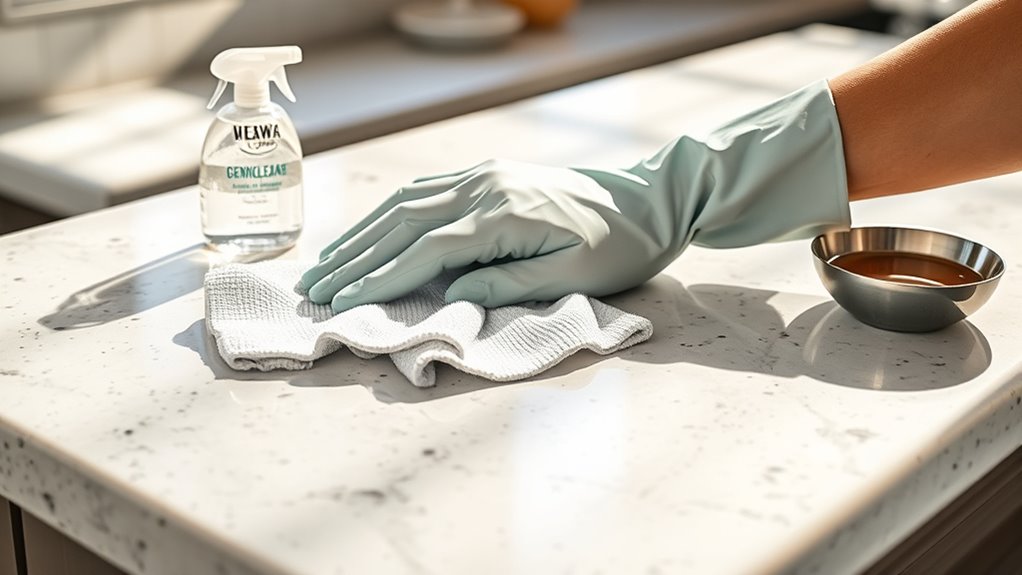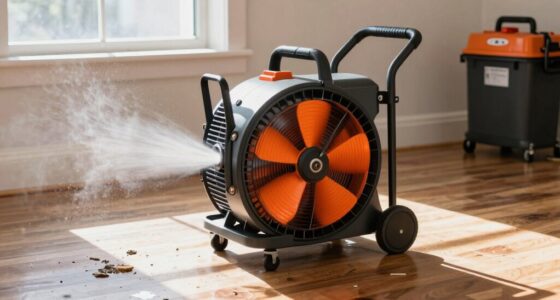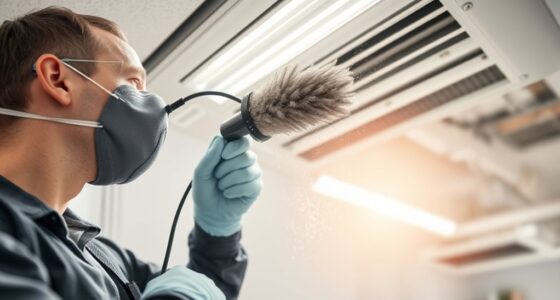To clean quartz countertops properly, promptly wipe up spills with a soft cloth and mild soap or a pH-balanced cleaner. Use warm water and avoid harsh chemicals like bleach or abrasive scrubbers that can scratch or dull the surface. Regularly check for grit, dry the surface thoroughly, and protect it with trivets or cutting boards to prevent damage. If you want to learn more about maintaining your quartz countertops, keep exploring these tips.
Key Takeaways
- Wipe daily with a soft cloth and mild dish soap or pH-balanced quartz cleaner to remove dust and dirt.
- Address spills immediately with a damp cloth and gentle cleaning to prevent stains from setting.
- Use baking soda paste for stubborn stains, leaving it on briefly before wiping clean.
- Avoid abrasive cleaners, steel wool, and harsh chemicals like bleach to prevent surface damage.
- Protect the surface from heat and scratches by using trivets, hot pads, and cutting boards during use.

Quartz countertops are a popular choice for kitchens and bathrooms because they combine beauty with durability. However, even the toughest surfaces require proper care to maintain their appearance and longevity. One of the key aspects of caring for quartz is effective stain removal. When spills happen, act quickly to prevent stains from setting. Use a soft cloth or sponge dampened with warm water and a mild dish soap to gently clean the surface. For stubborn stains, a mixture of baking soda and water can be applied as a paste, left for a few minutes, then wiped away with a soft cloth. Avoid harsh chemicals like bleach or abrasive cleaners, as they can damage the surface or cause discoloration.
Act quickly with mild soap and water to prevent stains on quartz surfaces.
Preventing scratches is equally important to keep your quartz looking pristine. Since quartz is engineered for strength, it’s still susceptible to scratching from sharp or abrasive objects. Always use cutting boards when preparing food, never cut directly on the surface. Be cautious with heavy or sharp items—placing them gently and avoiding dragging can help prevent scratches. Regularly check your countertops for grit or debris that could cause scratches when you wipe or clean. Using a non-abrasive cloth or sponge will help minimize any potential damage during cleaning. Additionally, cleaning techniques that involve gentle, non-abrasive tools ensure the surface remains scratch-free over time.
In addition to stain removal and scratch prevention, routine maintenance plays a crucial role in preserving your quartz countertops. Wipe down the surface daily with a soft cloth to keep dust and dirt from accumulating. For more thorough cleaning, use a pH-balanced quartz cleaner or a mixture of warm water and mild dish soap. Always dry the surface thoroughly after cleaning to avoid water spots or streaks. When dealing with hard water deposits or soap scum, a vinegar and water solution can be effective—just be sure to rinse well afterward and dry the surface thoroughly.
Avoid using abrasive scrub brushes, steel wool, or harsh chemicals that can scratch or dull the finish. Also, steer clear of placing hot pots and pans directly on the surface—use trivets or hot pads to prevent heat damage. While quartz countertops are highly resistant to staining and scratching, consistent care and attention ensure they stay beautiful for years. With proper stain removal techniques, scratch prevention, and routine cleaning, your quartz surfaces will continue to shine and serve as a stunning centerpiece in your home.
Frequently Asked Questions
Can I Use Vinegar to Clean Quartz Countertops?
You shouldn’t use vinegar to clean your quartz countertops. Vinegar cleaning can damage the surface, as its acidity might etch or dull the quartz finish. For proper quartz surface maintenance, stick to mild soap and water or a gentle, pH-balanced cleaner. Regularly wiping down your countertops helps keep them looking their best without risking damage, ensuring your quartz surfaces stay beautiful and durable over time.
How Often Should I Seal Quartz Surfaces?
You don’t need to seal quartz surfaces regularly, as they are non-porous and resistant to stains. Typically, sealing frequency isn’t required, but it’s good to follow maintenance tips like cleaning spills promptly and avoiding harsh chemicals. If you notice dullness or stains, consider resealing, but most quartz countertops only need occasional cleaning and routine care. Regular upkeep keeps your surfaces looking pristine without much effort.
Are There Any Cleaning Products I Should Avoid?
You should avoid harsh chemicals and abrasive scrubbers when cleaning your quartz countertops. Many believe these products damage the surface, and that’s true—harsh chemicals can break down the resin, and abrasive scrubbers can scratch it. Stick to gentle cleaners like soap and water or a mild quartz-specific cleaner. Doing so preserves your countertop’s beauty and durability, ensuring it stays pristine for years to come.
Can I Use a Steam Cleaner on Quartz?
You shouldn’t use a steam cleaner on quartz countertops because the high heat and moisture can damage the surface. Quartz is non-porous and doesn’t require sealing, so you don’t need to worry about sealing after cleaning. Instead, stick to gentle cleaning methods like a soft cloth and mild soap. Avoid steam cleaning to keep your quartz looking its best and maintain its durability over time.
What Should I Do if I Notice Staining?
If you notice staining, don’t panic—your quartz countertops aren’t doomed! Start with gentle stain removal techniques like a mixture of mild dish soap and water, then apply a non-abrasive sponge. For stubborn stains, use a paste of baking soda and water, letting it sit before wiping away. Act quickly to prevent stains from setting, and always avoid harsh chemicals to keep your surface pristine.
Conclusion
Cleaning your quartz countertops is simple if you follow the right steps. Think of it like giving your surfaces a gentle spa treatment—they deserve it! By using soft cloths, mild cleaners, and avoiding harsh chemicals, you’ll keep your counters looking flawless and shiny. Just remember, regular care is like watering a plant—you nurture it, and it’ll reward you with lasting beauty. Keep up the routine, and your quartz will stay stunning for years to come.










